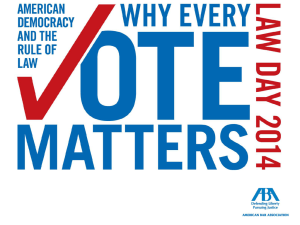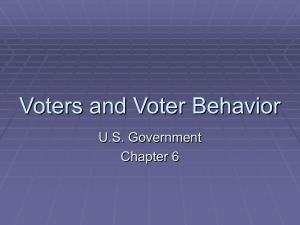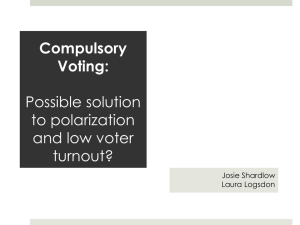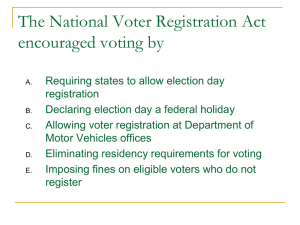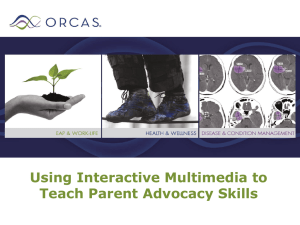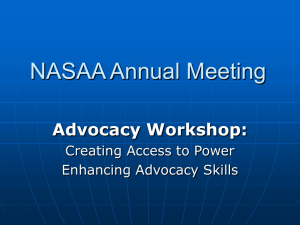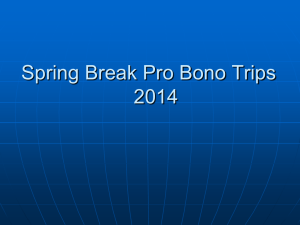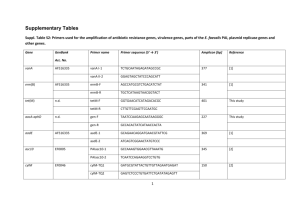Social Action - Delta Sigma Theta Sorority, Inc. Southern Region
advertisement
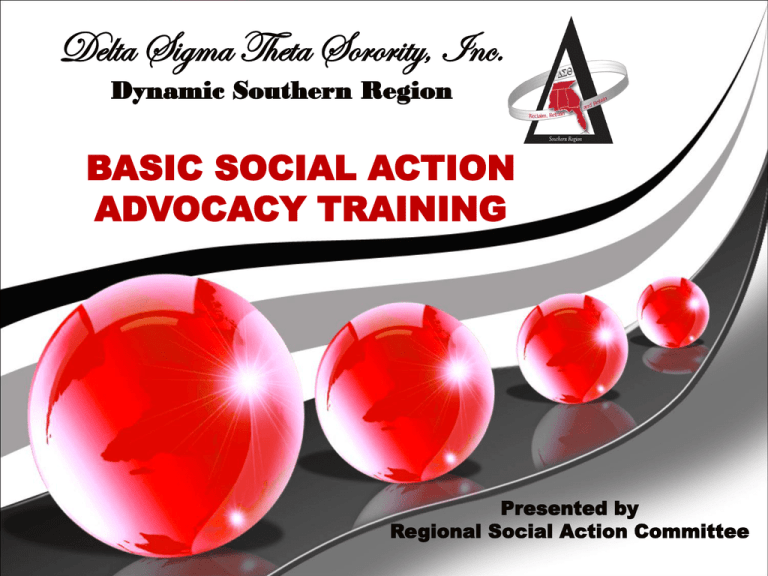
Delta Sigma Theta Sorority, Inc. Dynamic Southern Region BASIC SOCIAL ACTION ADVOCACY TRAINING Presented by Regional Social Action Committee SOCIAL ACTION DEFINED Vehicle through which the sorority establishes a position on an emerging or perennial public issue; Gives us a unique opportunity to advocate policies and legislation that will impact every area of the Five Point Programmatic Thrust; Determines the action to be taken, and directs the actions of members, chapters and representative bodies. “I will use my influence toward the enactment of laws for the protection of the unfortunate and weak and for the repeal of those depriving human beings of their privileges and rights.” 2 MISSION OF SOCIAL ACTION To promote leadership, advocacy, and empowerment to effect social change and public policy…link[ing] leaders and organizations through education and communication to promote progressive public policy that results in the improved well-being of individuals and families, especially African Americans. 3 Role of the National Social Action Commission Develop and coordinate social action programs and projects approved by the National Executive Board Stimulate interest in social action and educate chapters on current issues. Southern Region Commissioners − Laura Hall – AL − Janice Mathis – GA 4 Role of the Regional Social Action Coordinator Receive information and suggested action from the National Social Action Commissioners. Responsible for contacting the coordinators in each state in their respective regions, and ensuring that social action information is shared with and implemented by alumnae and collegiate chapters. Stimulate interest in social action and educate chapters on current issues. Southern Regional Social Action Coordinator: Rhonda Briggins-Ridley - SMLAC 5 Role of the State Social Action Coordinator Forwards the information received from the Regional Social Action Coordinator to each chapter in her state. The correspondence is sent to the Chapter President who shares the information with Chapter Social Action Chairs. The Chapter President and Social Action Chair then coordinate the appropriate chapter action in response to the information. The chapter ultimately sends a report of its action to National Headquarters – a copy is sent to the State Social Action Coordinator 6 Social Action in the Chapter Each chapter is expected to include a social action component in its operating structure. The customary procedure is that each chapter establishes a social action committee, headed by a Social Action chair. Following is the role of the chapter in social action: Appoint a chapter Social Action Chairperson. Conduct chapter social action activities and programs in the local community and/or on college/university campus. Initiate participation in state and national Delta Days at the capitol. Prepare resolutions for approval at the regional and national levels. Nominate recipients for the biennial social action awards. Receive social action information from State Social Action Coordinator, and/or the National Social Action Commission. Send report of chapter social action activities and program to the State Social Action Coordinator and to National Headquarters. 7 How to organize a Chapter Social Action Committee • Refer to Grand Chapter Bylaws for information on the duties of the National Social Action Commission. Review your chapter’s Policies and Procedures manual for guidance if they cover the committee’s procedures. Compile information on the committee’s previous activities if this has not been done. Encourage interested sorors to become members of the committee. Meet and set your committee agenda for the year. Create a budget for the year. Complete End of Year Report 8 Social Action (SA) Committee and Political Awareness and Involvement (PAI) Committee SA PAI Focus is advocacy, public policy (issues), and legislation Focus is the current laws, ordinances, rules, the electoral process, and elected officials Advocacy takes place first. Social Action raise awareness of issues, advocate for the creation of new legislation and change to existing laws. PAI is the second phase of SA. In the world of PAI, you discuss current laws; work on elections, voter mobilization, election protection and elected officials. 9 Social Action Committee and Political Action Committee Activity Examples Elections SA PAI Advocating for policies to ensure online voting registration or voter registration when obtaining or renewing your driver’s license Voter Registration Eliminating felony disenfranchisement Advocating for legislation to restore the rights of convicted felons so they can vote in elections Educating convicted felons who have met all the requirements to have the rights restored about the process of registering to vote. Holding voter registration drives targeting that population Advocating for/ensuring legislation is in place that allows citizens the right to vote early. E.g. Blocking efforts in Georgia (2014) to change early voting from 21 days to 6 days. GOTV: Early voting (Stroll to the Polls) Absentee voting (Absentee Ballot Drives) Advocating your Congressional member to develop and enact a new formula for Section IV & Section V of the Voting Rights Act that was struck down by the U.S. Supreme Court Forums to educate citizens on the importance of voting/Voting Rights Act of 1965 and what they need when they go to the ballot box 10 Social Action Committee and Political Action Committee Activity Examples Human Trafficking SA PAI and IA &I Advocates/address the elected official (who has the power to make laws) concerning Human Trafficking to ensure laws/legislation is passed that will benefit the community (advocacy/impacting public policy) At Candidate forum, you make sure the each candidate states their position on human trafficking so that voters know where the candidate stands on the position. Work on getting stronger language in the current human trafficking laws. Make sure the human trafficking laws are being enforced…meet with police department and others Develop letter writing campaign to elected officials about the need for stronger human trafficking language Report back to police/others regarding enforcement progress or lack there of 11 DON’T ISOLATE SOCIAL ACTION THERE CAN BE A SOCIAL ACTION COMPONENT FOR EVERY CHAPTER PROGRAM 12 Southern Region Social Action Agenda Economic Development “CODE RED” (Revitalizing Economic Development) Regional initiative on Black Friday Understanding Illegal Credit Practices* (Resolution) Minimum Wage Increase Job and Economy 13 Southern Region Social Action Agenda Educational Development Education (Equal and Equitable) Charter Schools vs. Public School Education (funding formulas) Suspension Rates of Black Students Standardized Testing (disproportionately impacted minorities and impact graduation rates) 14 Southern Region Social Action Agenda International Awareness and Involvement Immigration Reform - Congressional and state level Elimination of Violence Against Women (Bring Back Our Girls) Human Trafficking* (Resolution) Gender Inequality 15 Southern Region Social Action Agenda Physical and Mental Health Medicaid Expansion Affordable Care Act (Advocacy/Education/Awareness) Mental Illness Awareness Health Disparities (eliminating) HIV/AIDS – Know Your Status ACS Regional Cancer Awareness Program * Obesity (adult and childhood) 16 Southern Region Social Action Agenda Political Awareness and Involvement Voting Rights Act Supreme Court ruling on the VRA – Advocacy efforts to restore (Congressional) Combatting Voter Suppression (Resolution) 2014 Mid-term Election Gun control/violence*(Resolution) Stand Your Ground (Castle) Laws – eliminating Delta Days (Nation’s Capital, State Capitol and local) The Delta Political Institute: Preparing Deltas to 17 run for political office Questions ? 18

